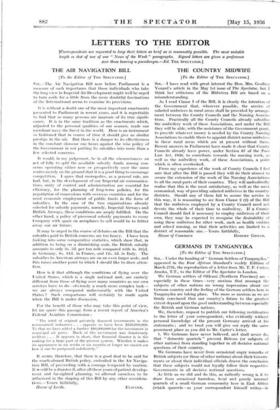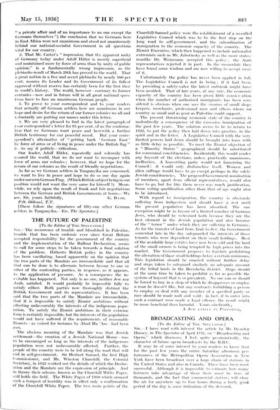GERMANS IN TANGANYIKA
[To the Editor of TILE SPECTATOR.] SIR,—Under the heading of " German Settlers of Tanganyika," appeared in the East African Standard's weekly Edition of March 27th, the reproduction of a letter from Mr. T. F. Carter, Arusha, T.T., to the Editor of The Spectator in London.
We German settlers of Oldeani (Northern Province) arc— especially in these times—very anxious that amongst the subjects of other nations no wrong impressions about our German country and the feeling of the German settlers here in Tanganyika are taking place. The more so anxious as we are firmly convinced that our country's future to the greatest extent depend upon the good understanding between especially the British and German nations.
We, therefore, request to publish our following rectification to the letter of your correspondent, who evidently without personal knowledge of the present Germany arrived at his statements ; and we trust you will give our reply the same prominent place as you did to Mr. Carter's letter.
1. We Germans have never believed, and shall never do, that " domestic quarrels " prevent Britons (or subjects of other nations) from standing together in all decisive national questions of their country.
We Germans have never from occasional angry remarks of British subjects (or those of other nations) about their Govern- ments or about their individual officials drawn the conclusion that these subjects would not loyally follow their respective Governments in all decisive national questions.
As little as we did and do this, as radically wrong is it to draw from occasional harmless, local and purely internal quarrels of a small German community here in East Africa (which quarrels—as your correspondent himself writes—is " a private affair and of no importance to no one except the Germans themselves ") the conclusion that we Germans here in East Africa were not unanimous and stood not unanimously bzhind our national-socialist Government in all questions vital for our country.
2. That Mr. Carter's " impression, that the apparent unity of Germany today under Adolf Hitler is merely superficial and maintained more by force of arms than by unity of public opinion," is a fundamentally wrong impression, as the plebiscite-result of March 29th has proved to the world. That a great nation in a free and secret plebiscite by nearly 100 per cent. assures its Leader and its Government of its fullest approval without reserve has certainly been for the first time in world's history. The world, however—contrary to former centuries—now and in future will in all great national ques- tions have to face an unanimous German people.
3. To prove to your correspondent and to your readers that actually all German settlers here are unanimous in our hope and desire for the return of our former colonies we all and voluntarily are putting our names under this letter.
4. We are very pleased to find in the latest paragraph of your correspondent's letter for 95 per cent. of us the confirma- tion that we Germans want peace and herewith a further British testimony for our peaceful mood. But your corre- spondent's alternative of " getting back ' German East' by force of arms or of living in peace under the British flag " is--to say it politely—ridiculous.
Our leader, Adolf Hitler, repeatedly and solemnly has assured the world, that we do not want to reconquer with force of arms our colonies ; however, that we hope for the return of our colonies as the result of friendly negotiations.
As far as we German settlers in Tanganyika are concerned, we want to live in peace and hope to do so one day again under our own German Flag. (Which British subject being in our position would not want the very same for himself ?) Mean- while, we rely upon the result of frank and fair negotiations between the German and British Governments at home.—We
[There follow the signatures of fifty-one other German settlers in Tanganyika.—En. The Spectator.]























































 Previous page
Previous page